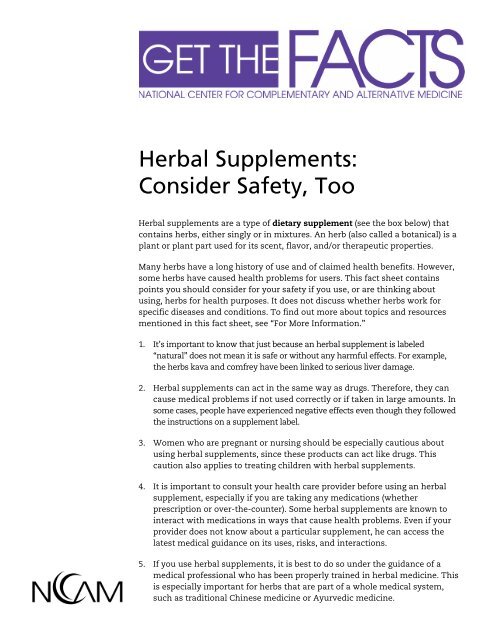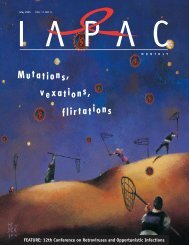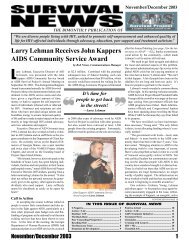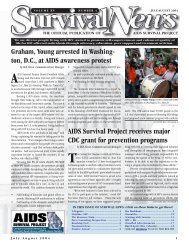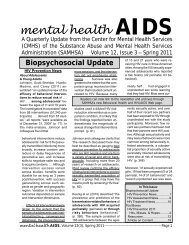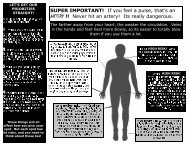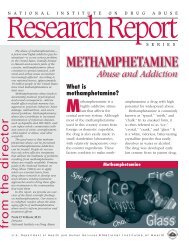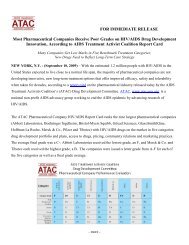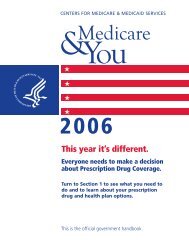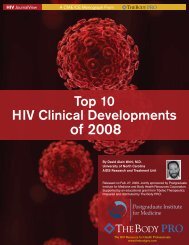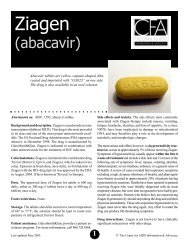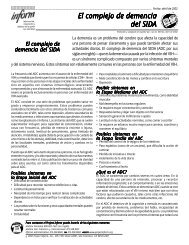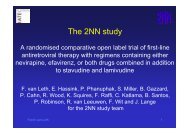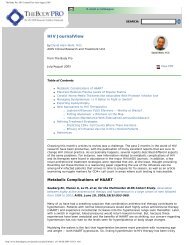Herbal Supplements: Consider Safety, Too - The Body
Herbal Supplements: Consider Safety, Too - The Body
Herbal Supplements: Consider Safety, Too - The Body
You also want an ePaper? Increase the reach of your titles
YUMPU automatically turns print PDFs into web optimized ePapers that Google loves.
<strong>Herbal</strong> <strong>Supplements</strong>:<br />
<strong>Consider</strong> <strong>Safety</strong>, <strong>Too</strong><br />
<strong>Herbal</strong> supplements are a type of dietary supplement (see the box below) that<br />
contains herbs, either singly or in mixtures. An herb (also called a botanical) is a<br />
plant or plant part used for its scent, flavor, and/or therapeutic properties.<br />
Many herbs have a long history of use and of claimed health benefits. However,<br />
some herbs have caused health problems for users. This fact sheet contains<br />
points you should consider for your safety if you use, or are thinking about<br />
using, herbs for health purposes. It does not discuss whether herbs work for<br />
specific diseases and conditions. To find out more about topics and resources<br />
mentioned in this fact sheet, see “For More Information.”<br />
1. It’s important to know that just because an herbal supplement is labeled<br />
“natural” does not mean it is safe or without any harmful effects. For example,<br />
the herbs kava and comfrey have been linked to serious liver damage.<br />
2. <strong>Herbal</strong> supplements can act in the same way as drugs. <strong>The</strong>refore, they can<br />
cause medical problems if not used correctly or if taken in large amounts. In<br />
some cases, people have experienced negative effects even though they followed<br />
the instructions on a supplement label.<br />
3. Women who are pregnant or nursing should be especially cautious about<br />
using herbal supplements, since these products can act like drugs. This<br />
caution also applies to treating children with herbal supplements.<br />
4. It is important to consult your health care provider before using an herbal<br />
supplement, especially if you are taking any medications (whether<br />
prescription or over-the-counter). Some herbal supplements are known to<br />
interact with medications in ways that cause health problems. Even if your<br />
provider does not know about a particular supplement, he can access the<br />
latest medical guidance on its uses, risks, and interactions.<br />
5. If you use herbal supplements, it is best to do so under the guidance of a<br />
medical professional who has been properly trained in herbal medicine. This<br />
is especially important for herbs that are part of a whole medical system,<br />
such as traditional Chinese medicine or Ayurvedic medicine.
6. In the United States, herbal and other dietary supplements are regulated by the U.S. Food<br />
and Drug Administration (FDA) as foods. This means that they do not have to meet the<br />
same standards as drugs and over-the-counter medications for proof of safety,<br />
effectiveness, and what the FDA calls Good Manufacturing Practices.<br />
About Dietary <strong>Supplements</strong><br />
Dietary supplements were defined in a law passed by Congress in 1994. A dietary<br />
supplement must meet all of the following conditions:<br />
• It is a product (other than tobacco) that is intended to supplement the diet and that<br />
contains one or more of the following: vitamins, minerals, herbs or other botanicals,<br />
amino acids, or any combination of the above ingredients.<br />
• It is intended to be taken in tablet, capsule, powder, softgel, gelcap, or liquid form.<br />
• It is not represented for use as a conventional food or as a sole item of a meal or the<br />
diet.<br />
• It is labeled as being a dietary supplement.<br />
7. <strong>The</strong> active ingredient(s) in many herbs and herbal supplements are not known. <strong>The</strong>re may<br />
be dozens, even hundreds, of such compounds in an herbal supplement. Scientists are<br />
currently working to identify these ingredients and analyze products, using sophisticated<br />
technology. Identifying the active ingredients in herbs and understanding how herbs affect<br />
the body are important research areas for the National Center for Complementary and<br />
Alternative Medicine (NCCAM).<br />
8. Published analyses of herbal supplements have found differences between what’s listed on<br />
the label and what’s in the bottle. This means that you may be taking less—or more—of the<br />
supplement than what the label indicates. Also, the word “standardized” on a product label<br />
is no guarantee of higher product quality, since in the United States there is no legal<br />
definition of “standardized” (or “certified” or “verified”) for supplements.<br />
9. Some herbal supplements have been found to be contaminated with metals, unlabeled<br />
prescription drugs, microorganisms, or other substances.<br />
10. <strong>The</strong>re has been an increase in the number of Web sites that sell and promote herbal<br />
supplements on the Internet. <strong>The</strong> Federal Government has taken legal action against a<br />
number of company sites because they have been shown to contain incorrect statements<br />
and to be deceptive to consumers. It is important to know how to evaluate the claims that<br />
are made for supplements. Some sources are listed below.<br />
NCCAM-2
For More Information<br />
NCCAM Clearinghouse<br />
<strong>The</strong> NCCAM Clearinghouse provides information on complementary and alternative medicine<br />
(CAM) and NCCAM, including publications and searches of Federal databases of scientific and<br />
medical literature. Examples of publications include “Are You <strong>Consider</strong>ing Using CAM?” and<br />
“10 Things To Know About Evaluating Medical Resources on the Web.” <strong>The</strong> Clearinghouse does<br />
not provide medical advice, treatment recommendations, or referrals to practitioners.<br />
Toll-free in the U.S.: 1-888-644-6226<br />
TTY (for deaf and hard-of-hearing callers): 1-866-464-3615<br />
Web site: nccam.nih.gov<br />
E-mail: info@nccam.nih.gov<br />
U.S. Food and Drug Administration (FDA)<br />
<strong>The</strong> FDA oversees the safety of many products, such as foods (including dietary supplements),<br />
medicines, medical devices, and cosmetics.<br />
Web site: www.fda.gov<br />
Toll-free in the U.S.: 1-888-463-6332<br />
Office of Dietary <strong>Supplements</strong> (ODS), NIH<br />
ODS seeks to strengthen knowledge and understanding of dietary supplements by evaluating<br />
scientific information, supporting research, sharing research results, and educating the public.<br />
Its resources include publications and the International Bibliographic Information on Dietary<br />
<strong>Supplements</strong> (IBIDS) database.<br />
Web site: www.ods.od.nih.gov<br />
E-mail: ods@nih.gov<br />
PubMed ®<br />
A service of the National Library of Medicine (NLM), PubMed contains publication information<br />
and (in most cases) brief summaries of articles from scientific and medical journals. CAM on<br />
PubMed, developed jointly by NCCAM and NLM, is a subset of the PubMed system and focuses<br />
on the topic of CAM.<br />
Web site: www.ncbi.nlm.nih.gov/entrez<br />
CAM on PubMed: nccam.nih.gov/camonpubmed/<br />
NCCAM-3
<strong>The</strong> Cochrane Database of Systematic Reviews<br />
<strong>The</strong> Cochrane Database of Systematic Reviews is a collection of evidence-based reviews<br />
produced by the Cochrane Library, an international nonprofit organization. <strong>The</strong> reviews<br />
summarize the results of clinical trials on health care interventions. Summaries are free; fulltext<br />
reviews are by subscription only.<br />
Web site: www.cochrane.org<br />
This publication is not copyrighted and is in the public domain.<br />
Duplication is encouraged.<br />
NCCAM has provided this material for your information. It is not intended to substitute<br />
for the medical expertise and advice of your primary health care provider. We<br />
encourage you to discuss any decisions about treatment or care with your health care<br />
provider. <strong>The</strong> mention of any product, service, or therapy is not an endorsement by<br />
NCCAM.<br />
National Institutes of Health<br />
♦♦♦<br />
U.S. Department of Health and Human Services<br />
Updated December 2006 D190


